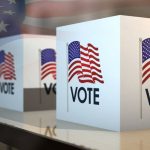National Voter Registration Day: Make Your Voice Heard
 Today has National Voter Registration Day—a good time to remind everyone register to vote so that all eligible voters can make their voices heard on Election Day (which, by the way, is Tuesday, November 6). While Wisconsin allows same-day voter registration, save yourself the time and the hassle of doing it all on Election Day and register now.
Today has National Voter Registration Day—a good time to remind everyone register to vote so that all eligible voters can make their voices heard on Election Day (which, by the way, is Tuesday, November 6). While Wisconsin allows same-day voter registration, save yourself the time and the hassle of doing it all on Election Day and register now.
You can register to vote online at My Vote up to 20 days before Election Day (para Mi Voto en español, haga clic aquí), by mail up to 20 days before Election Day, or in person at your municipal clerk’s office until the Friday before Election Day. I’ll explain how to register online at My Vote, but first let me explain who is eligible to register to vote in Wisconsin.
